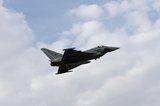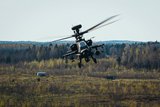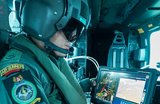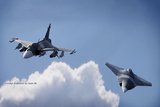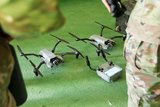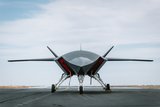Eurofighter delivers proposal to Spain for more Typhoons
Spanish Air Force F-18 aircraft (designated EF-18A) based in the Canary Islands would be replaced by 20 Typhoons with the new E-Scan AESA radar, under a formal proposal submitted by the Eurofighter consortium.
Negotiations are in progress between Airbus and the Spanish government, with a contract expected to be signed in 2021.
The 20 new aircraft would supplement the Spanish Air Force fleet of 73 Typhoons as part of the wider Project Halcon F-18 replacement programme.
A total of 64 more F-18s will be replaced in this initiative, with Typhoon likely to compete against Lockheed Martin (offering the F-35) and Boeing (with the F/A-18E/F).
Shephard Defence Insight estimates the overall 84-aircraft programme will cost $7.3 billion.
As part of our promise to deliver comprehensive coverage to our Defence Insight and Premium News subscribers, our curated defence news content provides the latest industry updates, contract awards and programme milestones.
Related Programmes in Defence Insight
More from Air Warfare
-
![Singapore Airshow 2026: Airbus-RSAF H225M teaming tests point to future scalability]()
Singapore Airshow 2026: Airbus-RSAF H225M teaming tests point to future scalability
The tests between a Republic of Singapore Air Force H225M and Airbus Flexrotor uncrewed aerial system were designed to allow the crew to receive and process real-time data from the UAS while maintaining direct command and control.
-
![Singapore Airshow 2026: Saab eyes “share” in future fighter market, targets 2027 CCA demo flight]()
Singapore Airshow 2026: Saab eyes “share” in future fighter market, targets 2027 CCA demo flight
The Swedish government is expected to make a decision on the next steps of the Future Fighter System Concept programme by 2030, with the current second phase focusing on technology knowledge expansion and demonstration flights.
-
![Singapore Airshow: Red Cat ramps up portfolio development amid “key” APAC opportunities]()
Singapore Airshow: Red Cat ramps up portfolio development amid “key” APAC opportunities
In the wake of its 1,842% year-on-year revenue increase in Q4 2025, Red Cat sees mass opportunities in the Asia-Pacific region as the company eyes an ongoing production increase and market growth.
-
![India confronts widening military helicopter gap as border demands intensify]()
India confronts widening military helicopter gap as border demands intensify
India’s major helicopter programmes are under the spotlight as the country turns to global partners to replace legacy helicopters with growing urgency.
-
![Singapore Airshow 2026: Boeing’s MQ-28A targets key 2028 date as Block II ground tests begin]()
Singapore Airshow 2026: Boeing’s MQ-28A targets key 2028 date as Block II ground tests begin
The MQ-28A Ghost Bat is the most mature CCA platform currently under development, with Boeing looking to accelerate its timelines and development of the aircraft.
-
![Latin American air forces look beyond fighters to revamp transport aircraft fleets]()
Latin American air forces look beyond fighters to revamp transport aircraft fleets
The Mexican Air Force has become the first Latin American operator of the C-130J Super Hercules, but the service is not alone in acquiring a tactical airlifter in recent months.









